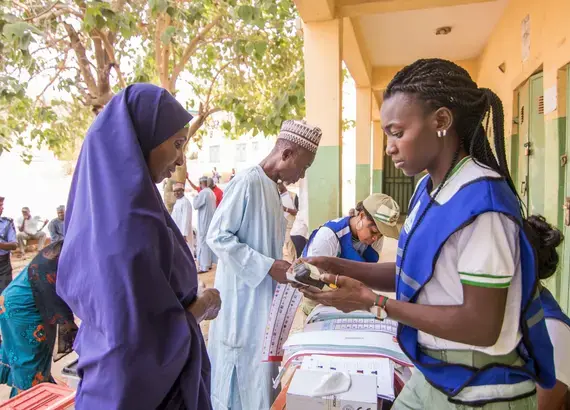
Success Story
The Future of Observer Rights
For the first time ever, the United Nations (UN) Special Rapporteurs for Human Rights Defenders and for the Right to Peaceful Assembly and Association have explicitly recognized election observers, in particular nonpartisan citizen observers, as human rights defenders and called on member states to “enable independent and impartial election observation by all monitors, including from abroad.”
In addition, member states are urged “to take all necessary steps to establish conditions that allow national and international election observers to effectively do their work, and to protect them from any violence, threats, retaliation, adverse discrimination, pressure or any other arbitrary action as a consequence of their legitimate exercise of their rights and freedoms.”
Nonpartisan citizen election observation has been one of the most important democratic developments over the last 30 years and has led to major gains in electoral integrity, building sustainable civic institutions that promote accountability, transparency, inclusion and long-term public engagement around elections.
However, credible citizen monitoring organizations around the world are facing increasingly sophisticated attempts to impede their efforts to safeguard the electoral process. Restrictions on citizen observers are often a warning sign for further authoritarian tactics, including strategic obstructions on fundamental freedoms of movement, association, and information that could expand to undermine civil society more broadly.
Barriers to the right to observe often include repressive laws and regulations that make it difficult, if not impossible, for organizations to gain and maintain legal status, obtain funding or technical assistance from foreign sources, to access key parts of the electoral process, or to collect and publicize information about the elections. Observers, especially in closed or closing spaces, are at heightened risk of intimidation, harassment, arrest, and violence.
Observers may sometimes face less direct restrictions that nonetheless impact their ability to effectively observe the process, for instance growing threats of internet outages and restrictions on the use of mobile phones around elections. The accreditation process for observers in many countries is becoming overly cumbersome, prohibitive or intentionally opaque, which can threaten the ability of groups to sufficiently organize, train and deploy observers for election day.
These kinds of restrictions fly in the face of fundamental freedoms enshrined in domestic constitutions, as well as broadly recognized regional and international standards. The right to assembly, the right to take part in public affairs, and the right to seek and impart information about the conduct of election processes combine to protect those who seek to join together to monitor elections. These rights are outlined in the International Covenant on Civil and Political Rights (ICCPR), and reinforced in the Declaration of Global Principles for Nonpartisan Election Observation and Monitoring by Citizen Organizations as well as numerous regional instruments.
Despite this, the erosion of observer rights continues at an accelerating pace, reducing the ability to effectively safeguard elections, build confidence in the process, and hold institutions accountable. This is a global, not regional, challenge and must be met as such. NDI is working with other international observer groups, in particular the Organization for American States (OAS), through the Declaration of Principles for International Election Observation (DoP) process that was launched at the UN in 2005 and with the Global Network for Domestic Election Monitors (GNDEM) to elevate this issue and defend the rights of citizen and international observers.
Earlier this year, GNDEM with NDI undertook comparative and normative research on obstacles to citizen observation and brought together leaders from organizations who are facing closing space and under threat to discuss how to bolster observer rights. Going forward they look to develop standards for accreditation and other key aspects of observer rights as well as, for the first time ever, produce a global assessment of the state of citizen observation.
The first major success of these efforts is the UN Special Rapporteurs statement explicitly recognizing observers, particularly citizen observers, as human rights defenders. This affords them greater protection and recourse when under attack. This success does not mean that election observers will no longer face challenges. Those seeking to manipulate elections will continue to close political space and undermine observer rights. However, the statement of the UN Special Rapporteurs provides valuable support and redress, particularly for citizen observers.
Further, the onus remains on the international community and democracy activists around the world to promote and increase the space for credible, nonpartisan election observers. This means vocally pushing back against laws, regulations or accreditation procedures that seek to limit the voice of election observers, restrict the number or movement of observers, or present technical or logistical burdens that hamper organizing efforts. Intimidation and violence targeted at election observers should be considered both an electoral integrity and human rights issue.
Likewise, observer rights issues should be incorporated as part of the overall evaluation of the quality of the process by both citizen and international observers. In this regard, it is important for citizen observers to keep regular contact with international observers, where applicable, to ensure they are aware of any barriers to their right to observe; and similarly important for international observer missions to give due consideration and analysis of citizen observer rights in their public election assessment statements.
Increased vigilance and organized responses across the globe are critical to stymie the growing assault against election monitoring. The statement by the UN Special Rapporteur provides important momentum to elevate this issue and create safer spaces for observers. NDI will continue to actively work with the international observer community, GNDEM and individual citizen observer partners to defend the rights of civic organizations to observe elections and promote electoral integrity.
